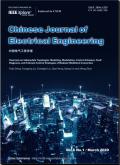Robust Iteration-dependent Least Mean Square-based Distribution Static Compensator Using Optimized PI Gains
Q1 Engineering
引用次数: 2
Abstract
A robust iteration-dependent least mean square (RIDLMS) algorithm-based fundamental extractor is developed to estimate the fundamental components of the load current for a four-wire DSTATCOM with a nonlinear load. The averaging parameter for calculating the variable step size is iteration dependent and uses variable tuning parameters. Rather than using the current value, the previous learning rate was used in this method to achieve a more adaptive solution. This additional control factor aids in determining the exact learning rate, resulting in reliable and convergent outcomes. Its faster convergence rate and the avoidance of local minima make it advantageous. The estimation of the PI controller gains is achieved through a self-adaptive multi-population algorithm. The adaptive change in the group number will increase exploration and exploitation. The self-adaptive nature of the algorithm was used to determine the subpopulation number needed according to the fitness value. The main advantage of this self-adaptive nature is the multi-population spread throughout the search space for a better optimal solution. The estimated gains of the PI controllers are used for the DC bus and AC terminal voltage error minimization. The RIDLMS-based control with PI gains obtained using the proposed optimization algorithm showed better power quality performance. The considered RIDLMS-supported control was demonstrated experimentally using d-SPACE-1104.基于优化PI增益的鲁棒迭代相关最小均方分布静态补偿器
提出了一种基于迭代相关最小均方(RIDLMS)算法的基波提取器,用于估计具有非线性负载的四线DSTATCOM负载电流的基波分量。用于计算可变步长的平均参数与迭代相关,并使用可变调优参数。该方法不使用当前值,而是使用之前的学习率来获得更自适应的解决方案。这个额外的控制因素有助于确定准确的学习率,从而产生可靠和收敛的结果。它具有更快的收敛速度和避免局部极小值的优点。通过自适应多种群算法实现PI控制器增益的估计。群体数量的适应性变化将增加勘探和开发。利用算法的自适应特性,根据适应度值确定所需的子种群数量。这种自适应特性的主要优点是多种群分布在整个搜索空间中,以获得更好的最优解。PI控制器的估计增益用于直流母线和交流端子电压误差最小化。采用该优化算法获得的基于ridlms的PI增益控制具有更好的电能质量性能。采用d-SPACE-1104实验验证了ridlms支持的控制。
本文章由计算机程序翻译,如有差异,请以英文原文为准。
求助全文
约1分钟内获得全文
求助全文
来源期刊

Chinese Journal of Electrical Engineering
Energy-Energy Engineering and Power Technology
CiteScore
7.80
自引率
0.00%
发文量
621
审稿时长
12 weeks
 求助内容:
求助内容: 应助结果提醒方式:
应助结果提醒方式:


